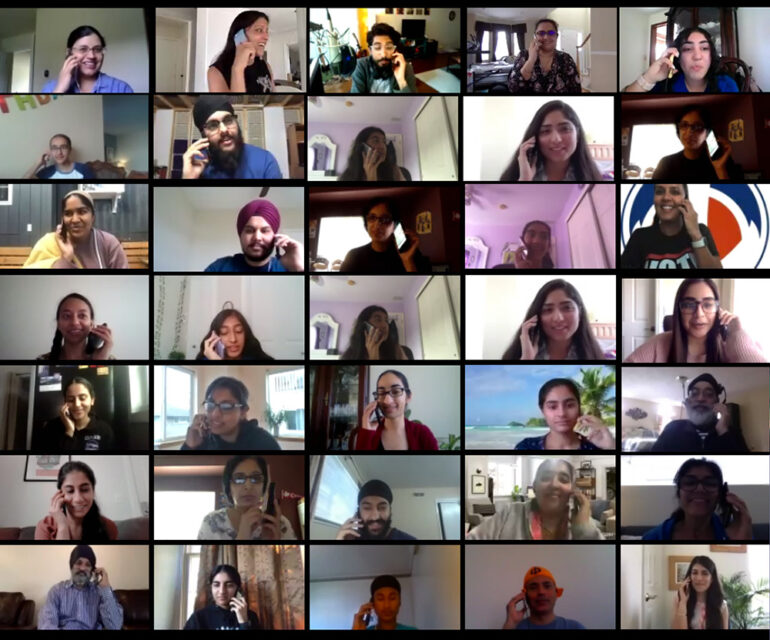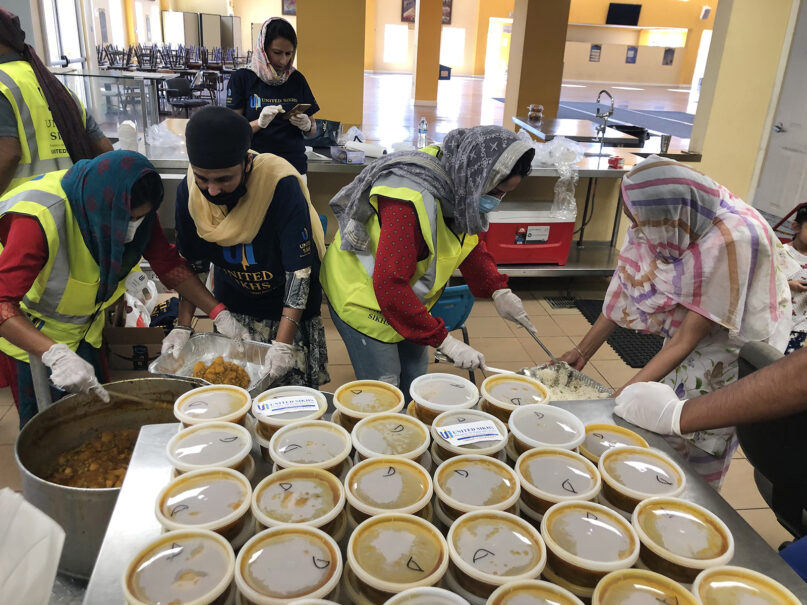How Sikhs combine spirituality with civic engagement
In a pivotal election, Sikhs are making their voices heard in ways that are as true to Sikhi as they are to the best American values
November 3, 2020
By Simran Jeet Singh
(RNS) — This is a pivotal election, and Sikhs — like countless other Americans — are making their voices heard, in ways that are as true to Sikhi as they are to the best American values that will help us after the election is over.
There is a long history of civic participation in Sikhi. The founders of the faith, the 10 Sikh Gurus, were leaders who engaged politically in various ways, from organizing communities and establishing cities to meeting with emperors and opposing tyrants.
The basis for Sikh political engagement could not be more clear. The Gurus’ teachings call on all Sikhs to actively take on justice work. We are all called to be saint-soldiers, cultivating ourselves spiritually while also serving all those around us. Seva — selfless service in Punjabi — is a natural outgrowth of love: People who are truly connected spiritually will feel moved to reduce suffering and seek justice.
This balance of the internal and external is captured by the Sikh concept and practice of miri-piri, that we must each engage our inner cultivation while extending our love beyond ourselves. It’s this basic outlook that creates a foundation for Sikhs to participate in their communities.
So what does this intersection of spiritual life and civic engagement look like in practice?
It starts locally. The turmoil of 2020 has provided ample opportunities for Sikh sangats, as we call our congregations, to respond to increased need in their communities. Across the country, Sikhs, through their gurdwaras (houses of worship), individually or in small groups, have stepped up to provide foodstuffs, hot meals and sanitary supplies to a wide range of people, including health care workers on the front lines, area food banks, international students, homeless populations or anyone else who needs some extra help.
But the Sikh community is leaning in to civic engagement beyond charity work. Sikh communities from Connecticut to California were active at many #BlackLivesMatter demonstrations over the summer that followed the killing of George Floyd, in many cases distributing food, water and medical supplies to protesters.

Sikh Coalition volunteers during a phone bank make calls to reach Sikh voters in key swing states. Photo courtesy of the Sikh Coalition
This month, Sikh organizations have been working hard to make sure that Sikh Americans have been registered and motivated to vote. The Sikh Coalition, for which I serve as a senior fellow, has recruited sevadaars (volunteers) from the community to help their sangat members check their voter registration and provided a free tool to do so through advocacy platform Phone2Action.
The group just launched a phone banking initiative of unprecedented scale for the community, working to connect sevadaars with thousands of Sikh households in key swing states to answer questions about election procedures and deadlines.
Sikhs are coming out to vote not just because they care about civil rights, religious freedom and immigration issues, but because they’re Americans who care about a wide range of issues, from tax rates to health care and foreign policy to the minimum wage.
Moreover, Sikhs are trained to use their privilege to seek justice and to stand with the most vulnerable from a spirit of oneness, love and selfless service.
Based on what I am seeing on the ground in communities all across the country, I feel encouraged that Sikh civic engagement is increasing in America. We can only hope that their values will help propel our country in the right direction.
In a pivotal election, Sikhs are making their voices heard in ways that are as true to Sikhi as they are to the best American values
.
Volunteers prepare meals at the Sikh Gurdwara San Jose for distribution to those affected by Northern California wildfires, Sept. 6, 2020, in San Jose, California. Photo courtesy of United Sikhs

Volunteers prepare meals at the Sikh Gurdwara San Jose for distribution to those affected by Northern California wildfires, Sept. 6, 2020, in San Jose, California. Photo courtesy of United Sikhs
November 3, 2020
By Simran Jeet Singh
(RNS) — This is a pivotal election, and Sikhs — like countless other Americans — are making their voices heard, in ways that are as true to Sikhi as they are to the best American values that will help us after the election is over.
There is a long history of civic participation in Sikhi. The founders of the faith, the 10 Sikh Gurus, were leaders who engaged politically in various ways, from organizing communities and establishing cities to meeting with emperors and opposing tyrants.
The basis for Sikh political engagement could not be more clear. The Gurus’ teachings call on all Sikhs to actively take on justice work. We are all called to be saint-soldiers, cultivating ourselves spiritually while also serving all those around us. Seva — selfless service in Punjabi — is a natural outgrowth of love: People who are truly connected spiritually will feel moved to reduce suffering and seek justice.
This balance of the internal and external is captured by the Sikh concept and practice of miri-piri, that we must each engage our inner cultivation while extending our love beyond ourselves. It’s this basic outlook that creates a foundation for Sikhs to participate in their communities.
So what does this intersection of spiritual life and civic engagement look like in practice?
It starts locally. The turmoil of 2020 has provided ample opportunities for Sikh sangats, as we call our congregations, to respond to increased need in their communities. Across the country, Sikhs, through their gurdwaras (houses of worship), individually or in small groups, have stepped up to provide foodstuffs, hot meals and sanitary supplies to a wide range of people, including health care workers on the front lines, area food banks, international students, homeless populations or anyone else who needs some extra help.
But the Sikh community is leaning in to civic engagement beyond charity work. Sikh communities from Connecticut to California were active at many #BlackLivesMatter demonstrations over the summer that followed the killing of George Floyd, in many cases distributing food, water and medical supplies to protesters.

Sikh Coalition volunteers during a phone bank make calls to reach Sikh voters in key swing states. Photo courtesy of the Sikh Coalition
This month, Sikh organizations have been working hard to make sure that Sikh Americans have been registered and motivated to vote. The Sikh Coalition, for which I serve as a senior fellow, has recruited sevadaars (volunteers) from the community to help their sangat members check their voter registration and provided a free tool to do so through advocacy platform Phone2Action.
The group just launched a phone banking initiative of unprecedented scale for the community, working to connect sevadaars with thousands of Sikh households in key swing states to answer questions about election procedures and deadlines.
Sikhs are coming out to vote not just because they care about civil rights, religious freedom and immigration issues, but because they’re Americans who care about a wide range of issues, from tax rates to health care and foreign policy to the minimum wage.
Moreover, Sikhs are trained to use their privilege to seek justice and to stand with the most vulnerable from a spirit of oneness, love and selfless service.
Based on what I am seeing on the ground in communities all across the country, I feel encouraged that Sikh civic engagement is increasing in America. We can only hope that their values will help propel our country in the right direction.
No comments:
Post a Comment